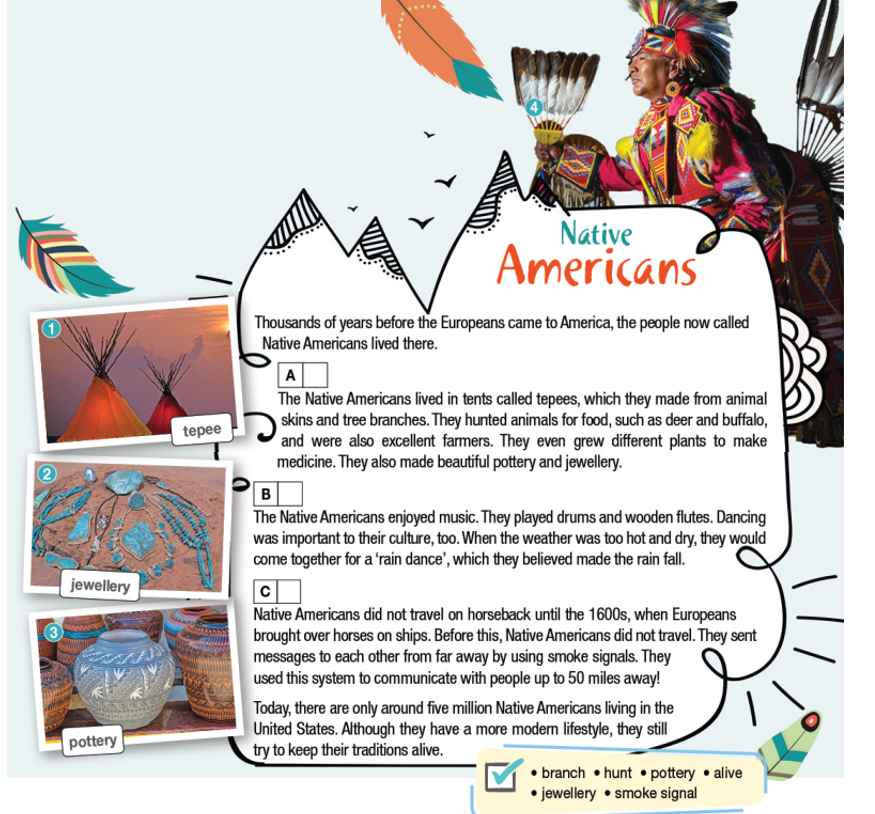Câu hỏi trong đề: Giải SGK Tiếng anh 10 Bright Culture Corner A có đáp án !!
Quảng cáo
Trả lời:
3. T
Hướng dẫn dịch:
3. Người Mỹ bản địa sử dụng khói để liên lạc. - Đúng
Hot: 1000+ Đề thi giữa kì 2 file word cấu trúc mới 2026 Toán, Văn, Anh... lớp 1-12 (chỉ từ 60k). Tải ngay
- Sách - Sổ tay kiến thức trọng tâm Vật lí 10 VietJack - Sách 2025 theo chương trình mới cho 2k9 ( 31.000₫ )
- Trọng tâm Toán, Văn, Anh 10 cho cả 3 bộ KNTT, CTST, CD VietJack - Sách 2025 ( 13.600₫ )
- Sách lớp 10 - Combo Trọng tâm Toán, Văn, Anh và Lí, Hóa, Sinh cho cả 3 bộ KNTT, CD, CTST VietJack ( 75.000₫ )
- Sách lớp 11 - Trọng tâm Toán, Lý, Hóa, Sử, Địa lớp 11 3 bộ sách KNTT, CTST, CD VietJack ( 52.000₫ )
CÂU HỎI HOT CÙNG CHỦ ĐỀ
Lời giải
Vietnamese people in the past were mostly farmers. They lived very simple lives, and their main jobs were growing crops and raising farm animals. For farmers those days, the ox and the water buffalo were very important. They used these cattle to pull ploughs to prepare the soil for crops. There were also groups of people mainly hunting or fishing for food. Most women were good at sewing. They used to make clothes for all the family members. When it came to entertainment, they had their own style of music using the gong. Vietnamese people used to communicate in their own way. They had their own body language which most people still use today.
Hướng dẫn dịch:
Người Việt Nam ngày xưa đa số đều là nông dân. Họ sống rất giản dị và công việc chính của họ là trồng trọt và chăn nuôi. Đối với người nông dân ngày đó, con bò và con trâu rất quan trọng. Họ sử dụng những con gia súc này kéo cày để chuẩn bị đất cho mùa màng. Cũng có những nhóm người săn bắn hoặc đánh cá để kiếm thức ăn là chủ yếu. Hầu hết phụ nữ đều may vá giỏi. Họ đã từng may quần áo cho tất cả các thành viên trong gia đình. Khi nói đến giải trí, họ có phong cách âm nhạc riêng bằng cách sử dụng cồng chiêng. Người Việt Nam đã từng giao tiếp theo cách riêng của họ. Họ có ngôn ngữ cơ thể riêng mà hầu hết mọi người vẫn sử dụng ngày nay.
Lời giải
Hướng dẫn dịch:
Người Mỹ bản địa
Những người châu Âu đến châu Mỹ từ hàng ngàn năm về trước thì ngày nay được gọi là thổ dân châu Mỹ đã sống ở đó.
Cuộc sống hàng ngày
Người Mỹ bản địa sống trong những chiếc lều gọi là tepees, thứ mà họ làm từ da động vật và cành cây. Người Mỹ bản địa săn bắt động vật để làm thức ăn, chẳng hạn như hươu và trâu, và họ cũng là những người nông dân xuất sắc. Họ thậm chí còn trồng các loại cây khác nhau để làm thuốc. Họ cũng làm đồ gốm và đồ trang sức tuyệt đẹp.
Giải trí
Người Mỹ bản địa rất thích âm nhạc. Họ chơi trống và sáo gỗ. Nhảy múa cũng quan trọng đối với văn hóa của họ. Khi thời tiết quá nóng và khô, họ sẽ cùng nhau tham gia một 'vũ điệu mưa', mà họ tin rằng sẽ khiến mưa rơi.
Du lịch & Giao tiếp
Người Mỹ bản địa đã không cưỡi ngựa cho đến những năm 1600, khi những người châu Âu mang ngựa lên tàu. Trước đó, người Mỹ bản địa không đi du lịch. Họ gửi tin nhắn cho nhau từ khoảng cách rất xa bằng cách sử dụng tín hiệu khói. Họ đã sử dụng hệ thống này để giao tiếp với những người ở cách xa tới 50 dặm!
Ngày nay, chỉ có khoảng năm triệu người Mỹ bản địa sống ở Hoa Kỳ. Mặc dù có lối sống hiện đại hơn, nhưng họ vẫn cố gắng giữ những nét truyền thống của mình.
Lời giải
Bạn cần đăng ký gói VIP ( giá chỉ từ 199K ) để làm bài, xem đáp án và lời giải chi tiết không giới hạn.
Lời giải
Bạn cần đăng ký gói VIP ( giá chỉ từ 199K ) để làm bài, xem đáp án và lời giải chi tiết không giới hạn.
Lời giải
Bạn cần đăng ký gói VIP ( giá chỉ từ 199K ) để làm bài, xem đáp án và lời giải chi tiết không giới hạn.
Lời giải
Bạn cần đăng ký gói VIP ( giá chỉ từ 199K ) để làm bài, xem đáp án và lời giải chi tiết không giới hạn.



